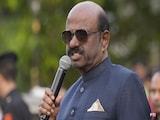Japan's Prime Minister Shinzo Abe leaves the controversial Yasukuni Shrine after paying tribute to the war dead.
Tokyo:
Japanese Prime Minister Shinzo Abe visited Tokyo's controversial Yasukuni Shrine for war dead on Thursday, a move likely to anger Asian neighbours China and South Korea.
Tokyo's relations with Beijing and Seoul are already strained by territorial rows and disputes stemming from Japan's wartime occupation of large parts of China and its 1910-1945 colonisation of the Korean peninsula.
China and South Korea have repeatedly expressed anger in the past over Japanese politicians' visits to Yasukuni Shrine, where Japanese leaders convicted as war criminals by an Allied tribunal are honoured along with war dead. The shrine is seen in parts of Asia as a symbol of Japanese past militarism.
Abe, who took office for a second term exactly one year ago on Thursday, entered the shrine in central Tokyo, clad in a morning suit and grey tie. Television carried live video of his motorcade making its way to the shrine.
Abe's visit to the shrine is the first by a serving Japanese prime minister since 2006. Former Prime Minister Junichiro Koizumi's annual visits to Yasukuni during his 2001-2006 tenure were a major factor in the chill in ties between Japan and its Asian neighbours.
Abe, who succeeded Koizumi in 2006, stayed away during that term and repaired frayed ties with China with a summit meeting. But he has said he regretted not visiting the shrine during his first 2006-2007 term.
Visiting the shrine is part of Abe's conservative agenda to restore Japan's pride in its past and recast its wartime history with a less apologetic tone. He also wants to ease the restraints of Japan's post-World War Two pacifist constitution on the military.
Sino-Japanese ties, already strained by a row over tiny Japanese-controlled islands in the East China Sea that are also claimed by Beijing, chilled even further after China last month announced a new air defence identification zone that included airspace over the disputed islands.
China has criticised Japan's plans unveiled earlier this month to boost defence spending in coming years, buying early warning planes, beach assault vehicles and troop-carrying aircraft while seeking closer ties with Asian partners to counter a more militarily assertive China.
Abe has been active on the diplomatic front during his one year in office, but has not held summits with either Chinese or South Korean leaders.
Tokyo's relations with Beijing and Seoul are already strained by territorial rows and disputes stemming from Japan's wartime occupation of large parts of China and its 1910-1945 colonisation of the Korean peninsula.
China and South Korea have repeatedly expressed anger in the past over Japanese politicians' visits to Yasukuni Shrine, where Japanese leaders convicted as war criminals by an Allied tribunal are honoured along with war dead. The shrine is seen in parts of Asia as a symbol of Japanese past militarism.
Abe, who took office for a second term exactly one year ago on Thursday, entered the shrine in central Tokyo, clad in a morning suit and grey tie. Television carried live video of his motorcade making its way to the shrine.
Abe's visit to the shrine is the first by a serving Japanese prime minister since 2006. Former Prime Minister Junichiro Koizumi's annual visits to Yasukuni during his 2001-2006 tenure were a major factor in the chill in ties between Japan and its Asian neighbours.
Abe, who succeeded Koizumi in 2006, stayed away during that term and repaired frayed ties with China with a summit meeting. But he has said he regretted not visiting the shrine during his first 2006-2007 term.
Visiting the shrine is part of Abe's conservative agenda to restore Japan's pride in its past and recast its wartime history with a less apologetic tone. He also wants to ease the restraints of Japan's post-World War Two pacifist constitution on the military.
Sino-Japanese ties, already strained by a row over tiny Japanese-controlled islands in the East China Sea that are also claimed by Beijing, chilled even further after China last month announced a new air defence identification zone that included airspace over the disputed islands.
China has criticised Japan's plans unveiled earlier this month to boost defence spending in coming years, buying early warning planes, beach assault vehicles and troop-carrying aircraft while seeking closer ties with Asian partners to counter a more militarily assertive China.
Abe has been active on the diplomatic front during his one year in office, but has not held summits with either Chinese or South Korean leaders.
© Thomson Reuters 2013















